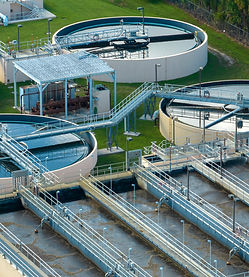
INDUSTRIAL WASTEWATER TREATMENT PLANT
The Effluent Treatment Plant is a system designed to treat industrial effluent or sanitary sewage, removing impurities and polluting substances before disposal or reuse. Essential for compliance with environmental regulations and operational sustainability, the ETE allows industries to reduce environmental impacts, meet legal requirements and optimize the use of water resources.
At GIGWATER, we develop customized industrial WWTP projects that take into account the type of effluent generated, the production process and the space available, guaranteeing efficiency, compliance and low operating costs. Our portfolio ranges from compact wastewater treatment plants to complete systems for large industrial plants.
HOW AN EFFLUENT TREATMENT PLANT WORKS
The effluent treatment system is made up of a sequence of physical, chemical and biological processes that vary according to the type of effluent and the level of treatment required. The main stages of sewage and effluent treatment include:
1. PRELIMINARY TREATMENT
Removal of coarse solids, oils and grease by means of grids, sieves and separator boxes, avoiding obstructions and protecting the next stages of the process.
2. PRIMARY TREATMENT
It decants and separates settleable and floating solids, reducing the load of impurities and preparing the effluent for subsequent biological treatment.
3. SECONDARY TREATMENT
Application of biological processes, such as activated sludge, anaerobic reactors or batch systems, which use micro-organisms to degrade organic matter.
4. TERTIARY TREATMENT
It decants and separates settleable and floating solids, reducing the load of impurities and preparing the effluent for subsequent biological treatment.
5. DEWATERING
OF SLUDGE
Sludge from treatment is thickened and dewatered using centrifuges, filter presses or drying beds, allowing it to be disposed of.
Each project is developed by GIGWATER's technical team based on laboratory studies and hydrodynamic simulations, ensuring performance, efficiency and compliance with current environmental standards.
TYPES AND VARIATIONS OF WASTEWATER TREATMENT PLANTS

OILY EFFLUENT TREATMENT PLANT

TREATMENT PLANT
OF BIOLOGICAL EFFLUENTS

BATCH EFFLUENT TREATMENT PLANT

TREATMENT PLANT
WITH PHYSICAL-CHEMICAL SYSTEM

WHY INVEST IN AN INDUSTRIAL WASTEWATER TREATMENT PLANT
SUSTAINABILITY AND STRENGTHENING THE CORPORATE IMAGE
ENVIRONMENTAL COMPLIANCE AND REDUCING THE RISK OF FINES AND SANCTIONS
Investing in an industrial effluent treatment plant is more than a legal requirement: it's a strategic decision. A well-designed effluent treatment plant guarantees:
REDUCED OPERATING COSTS WITH WATER CONSUMPTION AND DISPOSAL
ASSET APPRECIATION AND INCREASED COMPETITIVENESS IN THE MARKET
MARKETS THAT STAND OUT IN THE USE OF ETE
-
CHEMICAL AND PETROCHEMICAL: They reduce toxic compounds and heavy metals, guaranteeing environmental safety.
-
FOOD AND DAIRY PRODUCTS: They treat effluents with a high organic load, allowing water to be reused and disposed of within regulations.
-
TEXTILES AND COSMETICS: They remove dyes, oils and solvents, contributing to more sustainable processes.
-
AUTOMOTIVE AND METALLURGY: They treat oily effluents and those containing metals, making it possible to reuse water efficiently.
-
MINING AND CONSTRUCTION: They control solids and impurities, promoting reuse in industrial processes.
-
AGRIBUSINESS AND PLANT PROCESSING: They reduce organic load and nutrients, favoring the sustainable use of treated water.
GIGWATER EXPERTISE APPLIED TO YOUR BUSINESS
With proven experience and in-house technology, GIGWATER is a benchmark among industrial wastewater treatment companies. Our sewage and effluent treatment plants are developed with a focus on performance, automation and sustainability, combining advanced engineering with in-depth technical knowledge.
LEARN MORE ABOUT OUR COMPANY












